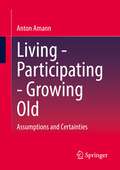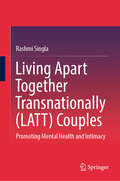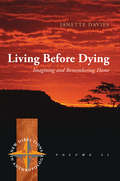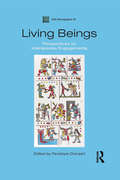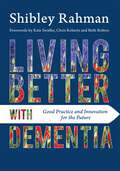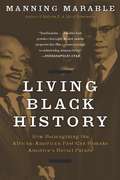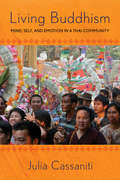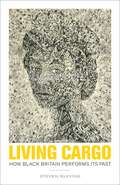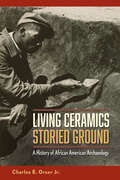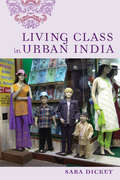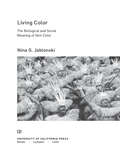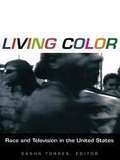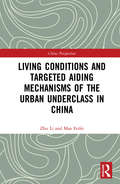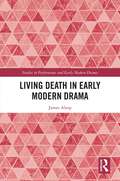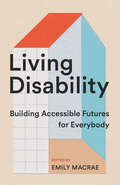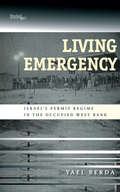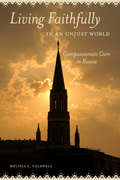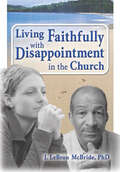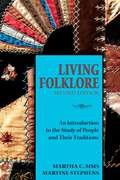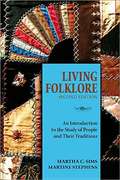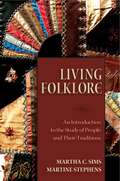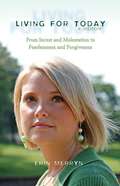- Table View
- List View
Living - Participating - Growing Old: Assumptions and Certainties
by Anton AmannLife must be understood as the result of evolution, and human life as the emergence of the species Sapiens from the genus Homo of the family of apes. If the emergence of human life as an evolutionary fact is coupled with the notion of social life, we are referred to the constructive production of human life forms, of which social participation is an integral part. On the one hand, participation is tied back to the phylogenesis of the species Sapiens, but on the other hand, it has to be newly acquired and practiced by every human being in the process of ontogenesis, depending on the environment. Participation in old age is a separate specification of the conditions of this process and can be illustrated on the basis of a large number of empirical findings.
Living Apart Together Transnationally (LATT) Couples: Promoting Mental Health and Intimacy
by Rashmi SinglaThis book provides deep insight into intimacy and distance in the complex, globalised world through the newly coined concept of couples living apart together transnationally (LATT). Based on a review of the past four decades’ seminal studies and narratives from a qualitative empirical study, including both heterosexual and same-sex couples, it shows intimacy can be maintained without geographical proximity. The book has a rich, layered, and nuanced exploration of LATT couples' experiences of relationship maintenance across distance and time through diverse ways, such as digital emotions, online sexual activity, and meaning–making through spirituality, which challenge existing Eurocentric conceptualisations of intimacy and relationships. It also reveals an array of “good practices” for relationship maintenance across countries, which can inspire other couples and practitioners. Thus, the book is an important resource, not only for academics in the disciplines of psychology, anthropology, cultural studies, family science, sociology, migration, and communication but particularly useful for practitioners dealing with couple relationships, such as counselors, social workers, and mental health advisors. It is also relevant for international organizations and multinational corporations working with couples living apart together transnationally.“The implications of this book for ‘how we live now’ are clear – in a more closely connected and mobile world, the possibility of living our most intimate relationships across distance will affect increasing numbers of us… the book’s informative, theoretical, and practical messages have valuable lessons for many of us now and in the future.”Dr Lucy Williams,University of Kent, the UK· “Living Apart Together Transnationally (LATT) Couples: Promoting mental health and intimacy” gives us insights into the everyday lives of couples living apart together (LAT) in a contemporary world characterized by globalisation, and pandemics that have affected border controls and migration policies in different countries. Rashmi Singla invites us to challenge the way we understand intimate relationships that are connected to physical proximity and provides us with innovative ways to maintain emotional and physical intimacy despite geographical separation. Sayaka Osanami TörngrenAssociate Professor of International Migration and Ethnic Relations, Malmö University, SwedenDr. Rashmi Singla’s book “Living Apart Together Transnationally” addresses a very important problem many modern couples encounter living apart in different countries. The increasing globalization of the job market and mass migration in the past four decades have made this topic more important than ever before. However, research about love and life in such conditions is still limited. The research presented in this book reveals some new qualitative research findings about how partners maintain health and intimacy in such challenging conditions. This book presents novel and invaluable research for scholars in the area of love and couple relationships. Victor Karandashev, Ph. D.,Professor of Aquinas College, Michigan, The U.S.A.Dr. Rashmi Singla's work, 'Living Apart Together Transnationally (LATT),' stands as a profoundly empirical exploration of long-distance couples spanning international borders. The book provides captivating revelations into the lives, intimacies, and spiritual dimensions of such relationships. Offering an interdisciplinary approach, it establishes a robust groundwork for further investigations in this emerging field. Lise Paulsen Galal, PhD, Associate Professor in Intercultural Studies, Roskilde University, Denmark.How important is proximity in intimate relationships when partners live apart in different countries? This question sits at the core of this timely book, which offers new insights, in part
Living Before Dying: Imagining and Remembering Home (New Directions in Anthropology #41)
by Janette DaviesThis in-depth description of life in a nursing/care home for 70 residents and 40 staff highlights the daily care of frail or ill residents between 80 and 100 years of age, including people suffering with dementia. How residents interact with care assistants is emphasised, as are the different behaviours of men and women observed during a year of daily conversations between the author, patients and staff, who share their stories of the pressures of the work. Living Before Dying shows a world where, in extreme old age, people have to learn how to cope with living communally.
Living Beings: Perspectives on Interspecies Engagements (ASA Monographs)
by Penelope DransartLiving Beings examines the vital characteristics of social interactions between living beings, including humans, other animals and trees.Many discussions of such relationships highlight the exceptional qualities of the human members of the category, insisting for instance on their religious beliefs or creativity. In contrast, the international case studies in this volume dissect views based on hierarchical oppositions between human and other living beings. Although human practices may sometimes appear to exist in a realm beyond nature, they are nevertheless subject to the pull of natural forces. These forces may be brought into prominence through a consideration of the interactions between human beings and other inhabitants of the natural world.The interplay in this book between social anthropologists, philosophers and artists cuts across species divisions to examine the experiential dimensions of interspecies engagements. In ethnographically and/or historically contextualized chapters, contributors examine the juxtaposition of human and other living beings in the light of themes such as wildlife safaris, violence, difference, mimicry, simulation, spiritual renewal, dress and language.
Living Better with Dementia: Good Practice and Innovation for the Future
by Chris Roberts Beth Britton Kate Swaffer Shibley RahmanWhat do national dementia strategies, constantly evolving policy and ongoing funding difficulties mean for people living well with dementia? Adopting a broad and inclusive approach, Shibley Rahman presents a thorough critical analysis of existing dementia policy, and tackles head-on current and controversial topics at the forefront of public and political debate, such as diagnosis in primary care, access to services for marginalised groups, stigma and discrimination, integrated care, personal health budgets, personalised medicine and the use of GPS tracking. Drawing on a wealth of diverse research, and including voices from all reaches of the globe, he identifies current policy challenges for living well with dementia, and highlights pockets of innovation and good practice to inform practical solutions for living better with dementia in the future. A unique and cohesive account of where dementia care practice and policy needs to head, and why, and how this can be achieved, this is crucial reading for dementia care professionals, service commissioners, public health officials and policy makers, as well as academics and students in these fields.
Living Black History: How Reimagining the African-American Past Can Remake America's Racial Future
by Manning MarableAre the stars of the Civil Rights firmament yesterday's news? In Living Black History scholar and activist Manning Marable offers a resounding "No!" with a fresh and personal look at the enduring legacy of such well-known figures as Malcolm X, Martin Luther King, Jr., Medgar Evers and W.E.B. Du Bois. Marable creates a "living history" that brings the past alive for a generation he sees as having historical amnesia. His activist passion and scholarly memory bring immediacy to the tribulations and triumphs of yesterday and reveal that history is something that happens everyday. Living Black History dismisses the detachment of the codified version of American history that we all grew up with. Marable's holistic understanding of history counts the story of the slave as much as that of the master; he highlights the flesh-and-blood courage of those figures who have been robbed of their visceral humanity as members of the historical cannon. As people comprehend this dynamic portrayal of history they will begin to understand that each day we-the average citizen-are "makers" of our own American history. Living Black History will empower readers with knowledge of their collective past and a greater understanding of their part in forming our future.
Living Buddhism: Mind, Self, and Emotion in a Thai Community
by Julia CassanitiIn Living Buddhism, Julia Cassaniti explores Buddhist ideas of impermanence, nonattachment, and intention as they are translated into everyday practice in contemporary Thailand. Although most lay people find these philosophical concepts difficult to grasp, Cassaniti shows that people do in fact make an effort to comprehend them and integrate them as guides for their everyday lives. In doing so, she makes a convincing case that complex philosophical concepts are not the sole property of religious specialists and that ordinary lay Buddhists find in them a means for dealing with life's difficulties. More broadly, the book speaks to the ways that culturally informed ideas are part of the psychological processes that we all use to make sense of the world around us. In an approachable first-person narrative style that combines interview and participant-observation material gathered over the course of two years in the community, Cassaniti shows how Buddhist ideas are understood, interrelated, and reinforced through secular and religious practices in everyday life. She compares the emotional experiences of Buddhist villagers with religious and cultural practices in a nearby Christian village. Living Buddhism highlights the importance of change, calmness (as captured in the Thai phrase jai yen, or a cool heart), and karma; Cassaniti's narrative untangles the Thai villagers' feelings and problems and the solutions they seek.
Living Cargo: How Black Britain Performs Its Past
by Steven BlevinsOffering a wide-ranging study of contemporary literature, film, visual art, and performance by writers and artists who live and work in the United Kingdom but also maintain strong ties to postcolonial Africa and the Caribbean, Living Cargo explores how contemporary black British culture makers have engaged with the institutional archives of colonialism and the Atlantic slave trade in order to reimagine blackness in British history and to make claims for social and political redress. Steven Blevins calls this reimagining &“unhousing history&”—an aesthetic and political practice that animates and improvises on the institutional archive, repurposing it toward different ends and new possibilities. He discusses the work of novelists, including Caryl Phillips, Fred D&’Aguiar, David Dabydeen, and Bernardine Evaristo; filmmakers Isaac Julien and Inge Blackman; performance poet Dorothea Smartt; fashion designer Ozwald Boateng; artists Hew Locke and Yinka Shonibare; and the urban redevelopment of Bristol, England, which unfolded alongside the public demand to remember the city&’s slave-trading past. Living Cargo argues that the colonial archive is neither static nor residual but emergent. By reassembling historical fragments and traces consolidated in the archive, these artists not only perform a kind of counter-historiography, they also imagine future worlds that might offer amends for the atrocities of the past.
Living Ceramics, Storied Ground: A History of African American Archaeology
by Charles E. Orser Jr.The role of historical archaeology in the study of African diaspora history and culture Exploring the archaeological study of enslavement and emancipation in the United States, this book discusses significant findings, the attitudes and approaches of past researchers, and the development of the field. Living Ceramics, Storied Ground highlights the ways historical archaeology can contribute to the study of African diaspora history and culture, as much of the daily life of enslaved people was not captured through written records but is evidenced in the materials and objects left behind. Including debates about cultural survivals in the 1920s, efforts to find “Africanisms” at Kingsley plantation in the 1960s, and the realization—as late as the 1970s—that colonoware pottery was created by enslaved people, Charles Orser looks at the influential and often mistaken ideas of prominent anthropologists, archaeologists, and historians. Extending to the present, Orser describes how archaeology better recognizes and appreciates the variety and richness of African American culture during slavery, due in large part to the Black archaeologists, past and present, who have worked to counter racism in the field. While acknowledging the colonial legacy of archaeology, Charles Orser outlines the ways the discipline has benefitted by adopting antiracist principles and partnerships with descendant communities. This book points to the contributions of excavators and researchers whose roles have been overlooked and anticipates exciting future work in African American archaeology. Publication of this work made possible by a Sustaining the Humanities through the American Rescue Plan grant from the National Endowment for the Humanities.
Living Cities in Japan: Citizens' Movements, Machizukuri and Local Environments (Nissan Institute/Routledge Japanese Studies)
by Carolin Funck André SorensenOver the last fifteen years local citizens' movements have spread rapidly throughout Japan. Created with the aim of improving the quality of the local environment, and of environmental management processes, such activities are widely referred to as machizukuri, and represent an important development in local politics and urban management in Japan. This volume examines the growth and nature of such civil society participation in local urban and environmental governance, raising important questions about the changing roles of and relations between central and local government, and between citizens and the state, in managing shared spaces. The machizukuri processes studied here can be seen as the focus of an important emerging trend toward increased civic participation in managing processes of urban change in Japan. The contributors provide a comprehensive overview of the machizukuri phenomenon through examination not only of theory and history, but also of case studies illustrating real changes in the institutions of place making and neighbourhood governance. Living Cities in Japan will be of particular value to readers interested in social, urban, geographical and environmental studies.
Living Class in Urban India
by Sara DickeyMany Americans still envision India as rigidly caste-bound, locked in traditions that inhibit social mobility. In reality, class mobility has long been an ideal, and today globalization is radically transforming how India's citizens perceive class. Living Class in Urban India examines a nation in flux, bombarded with media images of middle-class consumers, while navigating the currents of late capitalism and the surges of inequality they can produce. Anthropologist Sara Dickey puts a human face on the issue of class in India, introducing four people who live in the "second-tier" city of Madurai: an auto-rickshaw driver, a graphic designer, a teacher of high-status English, and a domestic worker. Drawing from over thirty years of fieldwork, she considers how class is determined by both subjective perceptions and objective conditions, documenting Madurai residents' palpable day-to-day experiences of class while also tracking their long-term impacts. By analyzing the intertwined symbolic and economic importance of phenomena like wedding ceremonies, religious practices, philanthropy, and loan arrangements, Dickey's study reveals the material consequences of local class identities. Simultaneously, this gracefully written book highlights the poignant drive for dignity in the face of moralizing class stereotypes. Through extensive interviews, Dickey scrutinizes the idioms and commonplaces used by residents to justify class inequality and, occasionally, to subvert it. Along the way, Living Class in Urban India reveals the myriad ways that class status is interpreted and performed, embedded in everything from cell phone usage to religious worship.
Living Color
by Nina G. JablonskiLiving Color is the first book to investigate the social history of skin color from prehistory to the present, showing how our body's most visible trait influences our social interactions in profound and complex ways. In a fascinating and wide-ranging discussion, Nina G. Jablonski begins with the biology and evolution of skin pigmentation, explaining how skin color changed as humans moved around the globe. She explores the relationship between melanin pigment and sunlight, and examines the consequences of rapid migrations, vacations, and other lifestyle choices that can create mismatches between our skin color and our environment. Richly illustrated, this book explains why skin color has come to be a biological trait with great social meaning-- a product of evolution perceived by culture. It considers how we form impressions of others, how we create and use stereotypes, how negative stereotypes about dark skin developed and have played out through history--including being a basis for the transatlantic slave trade. Offering examples of how attitudes about skin color differ in the U.S., Brazil, India, and South Africa, Jablonski suggests that a knowledge of the evolution and social importance of skin color can help eliminate color-based discrimination and racism.
Living Color: Race and Television in the United States
by Sasha TorresRecent media events like the confirmation hearings for Clarence Thomas, the beating of Rodney King and its aftermath, and the murder trial of O.J. Simpson have trained our collective eye on the televised spectacle of race. Living Color combines media studies, cultural studies, and critical race theory to investigate the representation of race on American TV.Ranging across television genres, historical periods, and racial formations, Living Color--as it positions race as a key element of television's cultural influence--moves the discussion out of a black-and-white binary and illustrates how class, gender, and sexuality interact with images of race. In addition to essays on representations of "Oriental" performers and African Americans in the early years of television, this collection also examines how the celebrity of the late MTV star Pedro Zamora countered racist and homophobic discourses; reveals how news coverage on drug use shifted from the white middle-class cocaine user in the early 1980s to the black "crack mother" of the 1990s; and takes on TV coverage of the Rodney King beating and the subsequent unrest in Los Angeles. Other essays consider O.J. Simpson's murder trial, comparing television's treatment of Simpson to that of Michael Jackson, Magic Johnson, Michael Jordan, and Clarence Thomas and look at the racism directed at Asian Americans by the recurring "Dancing Itos" on Jay Leno's Tonight Show.
Living Conditions and Targeted Aiding Mechanisms of the Urban Underclass in China (China Perspectives)
by Zhu Li Mao FeifeiBased on the approaches of questionnaire and interview, this book studies the urban subalterns formed with a considerable scale in China since the 1990s. By investigating their living status in detail, it depicts the mental conditions, class consciousness, migration, living difficulties and dilemmas of the subaltern class. It’s worth noting that in addition to the group at the bottom of the economic pyramid, this book expands the definition of subaltern by including the deviant underclass. Then it examines the factors causing the living dilemmas and provides suggestions aiming to mitigate them from the perspective of social succor. In the last chapter, this book focuses on the theoretical discussions on subaltern studies. New concepts such as the deviant subaltern group and social vigilance are created, and new theories such as production and transmission mechanism of the subaltern group are put forward.
Living Death in Early Modern Drama (ISSN)
by James AlsopThis book explores historical, socio-political, and metatheatrical readings of a whole host of dying bodies and risen corpses, each part of a long tradition of living death on stage.Just as zombies, ghouls, and the undead in modern media often stand in for present-day concerns, early modern writers frequently imagined living death in complex ways that allowed them to address contemporary anxieties. These include fresh bleeding bodies (and body parts), ghostly Lord Mayors, and dying characters who must carefully choose their last words – or have those words chosen for them by the living. As well as offering fresh interpretations of well-known plays such as Middleton’s The Lady’s Tragedy and Webster’s The White Devil, this innovative study also sheds light on less well-known works such as the anonymous The Tragedy of Locrine, Marston’s Antonio’s Revenge, and Munday’s mayoral pageants Chruso-thriambos and Chrysanaleia. The author demonstrates that wherever characters in early modern drama appear to straddle the line between this world and the next, it is rarely a simple matter of life and death.This book will be of great interest to students, scholars, and practitioners in theatre and performance studies, and cultural and social studies.
Living Disability: Building Accessible Futures for Everybody
by Emily MacraeHow can we build more accessible cities? Living Disability brings together vibrant perspectives on disability justice and urban systems. A musician and snow removal expert, a queer curator, a public pool aficionado, and a journalist turned city councillor – these are just some of the disabled writers exploring disability justice, analyzing urban systems, and proposing more equitable approaches to city building in this anthology. Essays and interviews push the conversation about accessibility beyond policy papers and compliance checklists to show how disabled people are already creating more inclusive spaces in cities of all sizes. Living Disability is universal in scope but intimate and local in focus, grounded in personal struggles and celebrations. Decisions about public transit, affordable housing, and park design all disproportionately impact disabled communities; by sharing stories and strategies, contributors consider the ways disabled thinkers and doers are embracing overlooked aspects of urban design and tackling the toughest problems facing cities. Each chapter provides context to welcome both disabled and non-disabled readers into conversations about the future of inclusion so that all readers can develop their own understanding of what accessible cities look and feel like. This book appeals to city builders of all stripes committed to learning from and working with underrepresented communities. It equips architects, designers, community leaders, innovators, and citizens with the key concepts they need to collaborate with rather than care for disabled neighbors."Living Disability is at once hopeful and infuriating, solemn and joyous. The stories shared within these pages point to both the past and future simultaneously – illuminating the struggles and joys and history of disabled life, while putting access barriers on blast in a way that is more necessary than ever. The deep, rich work of this collection lies in its embrace of complexity, community, grief, and also its belief in the capacity of our world (read: us) to change. May these stories touch your heart, kindle the flame of your anger, and move you forward into fighting for the better world we all deserve." – Amanda Leduc, author of Disfigured: On Fairy Tales, Disability, and Making Space
Living Dolls: The Return of Sexism
by Natasha WalterI once believed that we only had to put in place the conditions for equality for the remnants of old-fashioned sexism in our culture to wither away. I am ready to admit that I was wrong.'Empowerment, liberation, choice. Once the watchwords of feminism, these terms have now been co-opted by a society that sells women an airbrushed, highly sexualised and increasingly narrow vision of femininity. Drawing on a wealth of research and personal interviews, LIVING DOLLS is a straight-talking, passionate and important book that makes us look afresh at women and girls, at sexism and femininity - today.
Living Dolls: The Return of Sexism
by Natasha WalterI once believed that we only had to put in place the conditions for equality for the remnants of old-fashioned sexism in our culture to wither away. I am ready to admit that I was wrong.'Empowerment, liberation, choice. Once the watchwords of feminism, these terms have now been co-opted by a society that sells women an airbrushed, highly sexualised and increasingly narrow vision of femininity. Drawing on a wealth of research and personal interviews, LIVING DOLLS is a straight-talking, passionate and important book that makes us look afresh at women and girls, at sexism and femininity - today.
Living Emergency: Israel's Permit Regime in the Occupied West Bank
by Yael BerdaIn 1991, the Israeli government introduced emergency legislation canceling the general exit permit that allowed Palestinians to enter Israel. The directive, effective for one year, has been reissued annually ever since, turning the Occupied Territories into a closed military zone. Today, Israel's permit regime for Palestinians is one of the world's most extreme and complex apparatuses for population management. Yael Berda worked as a human rights lawyer in Jerusalem and represented more than two hundred Palestinian clients trying to obtain labor permits to enter Israel from the West Bank. With Living Emergency, she brings readers inside the permit regime, offering a first-hand account of how the Israeli secret service, government, and military civil administration control the Palestinian population. Through interviews with Palestinian laborers and their families, conversations with Israeli clerks and officials, and research into the archives and correspondence of governmental organizations, Berda reconstructs the institutional framework of the labyrinthine permit regime, illuminating both its overarching principles and its administrative practices. In an age where terrorism, crime, and immigration are perceived as intertwined security threats, she reveals how the Israeli example informs global homeland security and border control practices, creating a living emergency for targeted populations worldwide.
Living Faithfully in an Unjust World: Compassionate Care in Russia
by Melissa L. CaldwellWhat does it mean to be a compassionate, caring person in Russia, which has become a country of stark income inequalities and political restrictions? How might ethics and practices of kindness constitute a mode of civic participation in which "doing good"--helping, caring for, and loving one another in a world marked by many problems and few easy solutions--is a necessary part of being an active citizen? Living Faithfully in an Unjust World explores how, following the retreat of the Russian state from social welfare services, Russians' efforts to "do the right thing" for their communities have forged new modes of social justice and civic engagement. Through vivid ethnography based on twenty years of research within a thriving Moscow-based network of religious and secular charitable service providers, Melissa L. Caldwell examines how community members care for a broad range of Russia's population, in Moscow and beyond, through programs that range from basic health services to human rights advocacy. As the experiences of assistance workers, government officials, recipients, and supporters reveal, their work and beliefs are shaped by a practical philosophy of goodness and kindness. Despite the hardships these individuals witness on a regular basis, there is a pervasive sense of optimism that human kindness will prevail over poverty, injury, and injustice. Ultimately, what connects members of this diverse group is a shared belief that caring for others is not simply a practical matter or an idealistic vision but a project of faith and hope. Together care-seekers and care-givers destabilize and remake the meaning of "faith" and "faith-based" by putting into practice a vision of humanitarianism that transcends the boundaries between state and private, religious and secular.
Living Faithfully with Disappointment in the Church
by J. LeBron McBrideA practical approach to address spiritually crippling disappointment with the church! Feeling disappointment with your church can be spiritually devastating. Living Faithfully with Disappointment in the Church gives you a theological and family therapy approach to disillusionment in the church that is practical and realistic. The author, an ordained minister and a licensed family therapist, discusses with sensitivity and hope the problems and the ways to resolve issues of spiritual disappointment.Living Faithfully with Disappointment in the Church uses a theological basis to lay a foundation of understanding, and then provides real strategies from a family therapy perspective to deal with personal disappointments in the church. The book sensitively discusses real problems using real examples of how church dynamics can unwittingly cause spiritual disillusionment within even the most faithful, even in diligent attempts to serve God. Honest, reverent, and written from the perspective that each of us needs the church to cultivate our faith, this book provides non-simplistic yet hopeful answers to the most difficult of problems. Find comfort in these pages. Living Faithfully with Disappointment in the Church discusses: idealism about the church how churches function according to the dynamics of family systems how a controlling family affects church dynamics people who become codependent to the church adjustment to belief structures within the church addictive processes in organizations the psychological danger zone of failed beliefs how to recognize when to stay and when to move on to another church considerations for someone in a denominational crisis the uses of spirituality and religion in psychologically healthy waysa theoretical model that gives priority to building a relational church Living Faithfully with Disappointment in the Church is for ministers, chaplains, seminary students, pastoral counselors, Sunday school teachers, or anyone that is facing a spiritual crisis in their church. Each chapter includes questions for reflection and discussion.
Living Folklore, 2nd Edition: An Introduction to the Study of People and Their Traditions
by Martine Stephens Martha SimsLiving Folklore is a comprehensive, straightforward introduction to folklore as it is lived, shared and practiced in contemporary settings. Drawing on examples from diverse American groups and experiences, this text gives the student a strong foundation—from the field's history and major terms to theories and interpretive approaches. Living Folklore moves beyond genres and classifications, and encourages students who are new to the field to see the study of folklore as a unique approach to understanding people, communities, and day-to-day artistic communication. This revised edition incorporates new examples, research, and theory along with added discussion of digital and online folklore.
Living Folklore: An Introduction to the Study of People and Their Traditions
by Martine Stephens Martha SimsLiving Folklore is a comprehensive, straightforward introduction to folklore as it is lived, shared and practiced in contemporary settings. Drawing on examples from diverse American groups and experiences, this text gives the student a strong foundation-from the field's history and major terms to theories, interpretive approaches, and fieldwork. Many teachers of undergraduates find the available folklore textbooks too complex or unwieldy for an introductory level course. It is precisely this criticism that Living Folklore addresses; while comprehensive and rigorous, the book is specifically intended to meet the needs of those students who are just beginning their study of the discipline. Its real strength lies in how it combines carefully articulated foundational concepts with relevant examples and a student-oriented teaching philosophy.
Living Folklore: Introduction to the Study of People and their Traditions
by Martine Stephens Martha SimsLiving Folklore is a comprehensive, straightforward introduction to folklore as it is lived, shared and practiced in contemporary settings. Drawing on examples from diverse American groups and experiences, this text gives the student a strong foundation—from the field’s history and major terms to theories, interpretive approaches, and fieldwork. Many teachers of undergraduates find the available folklore textbooks too complex or unwieldy for an introductory level course. It is precisely this criticism that Living Folklore addresses; while comprehensive and rigorous, the book is specifically intended to meet the needs of those students who are just beginning their study of the discipline. Its real strength lies in how it combines carefully articulated foundational concepts with relevant examples and a student-oriented teaching philosophy.
Living For Today: From Incest and Molestation to Fearlessness and Forgiveness
by Erin MerrynSILENCE BROKEN AND STIGMAS SHATTERED-- HELP FOR INCEST SURVIVORS IS HERE Fans of Erin Merryn's heart-wrenching debut memoir Stolen Innocence were left wondering what would become of an emotionally fragile Erin after her confrontation with the reality and repercussions of being a child of incest and molestation. In Living for Today, Erin chronicles how she cultivated the strength to face her abuser and eventually found relief from years of emotional restlessness, while also igniting the beginnings of a new fearless journey. Living for Today chronicles that journey, which began with the unearthing of private shame, releasing of ugly memories, letting go of guilt, and becoming the mouthpiece of millions of her generation. In Living for Today, anyone who has felt victimized, ashamed, isolated, and silenced by their abusers will receive a roadmap for self-discovery, forgiveness, and empowerment. With real compassion and wisdom, this book can help readers overcome trauma and live fully and fearlessly for today.
